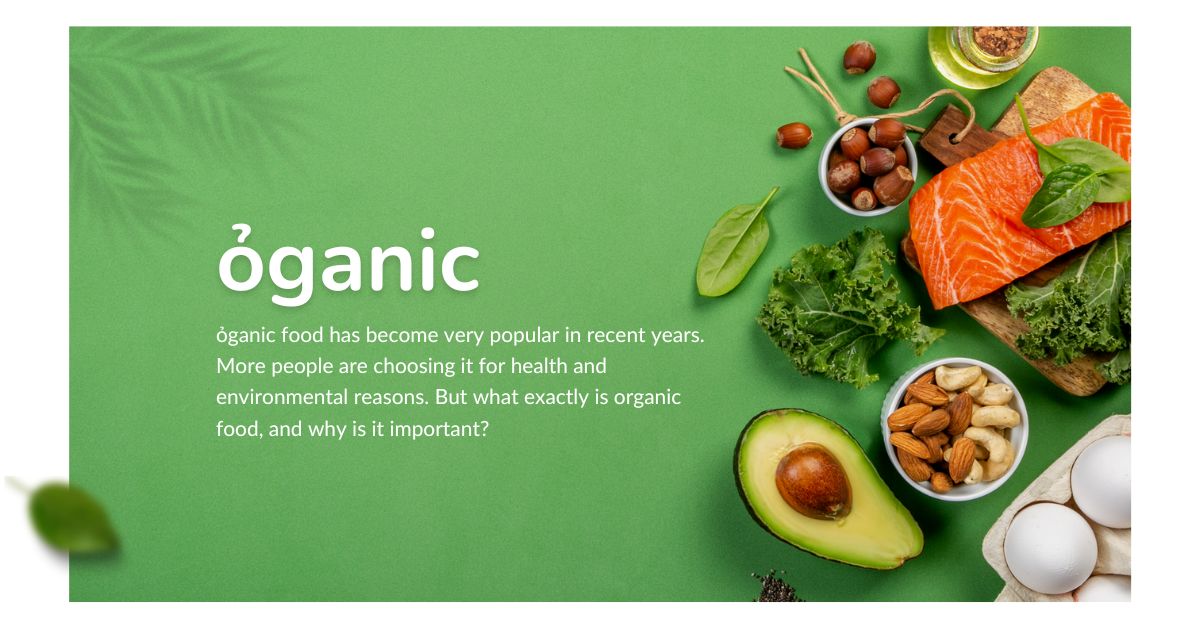
ỏganic food has become very popular in recent years. More people are choosing it for health and environmental reasons. But what exactly is organic food, and why is it important?
Organic food is grown without synthetic chemicals like pesticides or fertilizers. Organic farmers also avoid genetically modified organisms (GMOs). This means that organic food is produced using natural methods that protect the environment.
Many people believe that organic food is healthier. It may contain fewer harmful chemicals. Organic fruits and vegetables often have more nutrients like vitamins and antioxidants. However, the nutritional differences between organic and non-organic foods are not always huge.
Choosing organic food also helps the environment. Organic farming practices protect soil, water, and wildlife. Farmers use methods that promote biodiversity and keep the land healthy for future generations.
Animal products labeled as organic, like meat and eggs, come from animals raised in natural conditions. These animals are not given antibiotics or hormones, and they have more space to roam. This improves animal welfare and the quality of the products.
Although organic food has many benefits, it can be more expensive. This is because organic farming is more labor-intensive. Some people find it harder to afford or access organic food, but there are ways to include it in your diet without overspending.
What is ỏganic Food?
Organic food refers to agricultural products that are grown and processed without the use of synthetic chemicals such as pesticides, fertilizers, and genetically modified organisms (GMOs). Organic farming practices emphasize the use of natural processes and promote sustainability, soil health, and biodiversity.
The U.S. Department of Agriculture (USDA) sets strict standards for organic farming, which include:
- No synthetic pesticides or fertilizers
- No genetically modified organisms (GMOs)
- No artificial additives or preservatives
- Livestock raised in natural, humane conditions, with access to outdoor space and no routine use of antibiotics or hormones
Organic Certification
In many countries, organic foods must meet specific regulations to carry the organic certification label. In the U.S., for instance, products that meet USDA organic standards can use the USDA Organic Seal. This certification ensures that the food meets the organic criteria set by governing bodies, offering assurance to consumers.
Benefits of Organic Food
There are several key reasons why people choose organic food:
Fewer Chemicals
Organic food is grown without synthetic pesticides or herbicides. This means that organic produce generally contains fewer chemical residues compared to conventionally grown crops. While regulations limit chemical levels in conventional produce, many people prefer to reduce their exposure to synthetic substances as much as possible.
Better for the Environment
Organic farming practices promote ecological balance, reduce pollution, and enhance soil fertility. By avoiding synthetic fertilizers and pesticides, organic farms contribute to healthier ecosystems. Organic farming also emphasizes crop rotation, composting, and reduced tillage, which help maintain soil health and prevent erosion.
Higher Nutritional Value
Some studies suggest that organic foods may contain higher levels of certain nutrients, such as antioxidants, compared to conventionally grown foods. Although the differences are not always dramatic, many believe that organic farming methods result in healthier, more nutrient-rich crops.
Animal Welfare
For animal products like meat, eggs, and dairy, organic standards ensure better living conditions. Animals raised organically are given space to roam and are not routinely treated with antibiotics or hormones. Many consumers choose organic products for ethical reasons, as these standards prioritize animal welfare.
No GMOs
Organic food is free from genetically modified organisms (GMOs), which are created through the manipulation of an organism’s DNA. While GMOs are widely used in conventional farming, the long-term effects of GMOs on health and the environment remain a topic of debate. Consumers who are concerned about GMOs often opt for organic products.
Challenges and Considerations
While organic food offers many benefits, there are some challenges and factors to consider before making the switch:
Cost
Organic foods can be more expensive than conventional products due to more labor-intensive farming practices, lower crop yields, and stricter regulations. This can make organic food less accessible for some consumers.
Limited Availability
While organic food is widely available in many grocery stores, it may still be harder to find in certain regions or for specific products. Local farmers’ markets and health food stores tend to have a wider selection of organic items.
Shorter Shelf Life
Organic produce may have a shorter shelf life compared to conventional products, as it is not treated with synthetic preservatives. This means that organic food may spoil faster, requiring careful storage and timely consumption.
Not Always 100% Organic
It’s important to note that not all products labeled “organic” are entirely organic. In some cases, processed foods may contain up to 5% non-organic ingredients and still carry the USDA Organic Seal. Reading labels carefully ensures that you know exactly what you’re purchasing.
Is Organic Food Healthier?
While many consumers believe that organic food is healthier, scientific studies on the health benefits of organic food are mixed. Some research suggests that organic produce may contain higher levels of certain nutrients, such as antioxidants and vitamin C, while others show little difference in nutrient levels between organic and conventional foods. The choice often comes down to individual preference, environmental concerns, and ethical considerations.
How to Incorporate Organic Food into Your Diet
If you’re interested in adding more organic food to your diet but are concerned about cost or availability, here are a few tips:
- Start Small: Begin by purchasing organic versions of the foods you eat most often, such as fruits, vegetables, and dairy products.
- Buy in Season: Organic produce is often more affordable when it’s in season, as there is a higher supply.
- Shop Local: Farmers’ markets are a great place to find fresh, organic produce, often at lower prices than supermarkets.
- Prioritize Certain Foods: Some fruits and vegetables, like apples, strawberries, and spinach, tend to have higher pesticide residues when conventionally grown. Prioritize these items for organic purchase.
Conclusion
Organic food offers a range of benefits, from reducing chemical exposure to supporting environmentally friendly farming practices. While it may come with a higher price tag and limited availability, many consumers find that the advantages, including better animal welfare and potentially higher nutritional value, make it worth the investment. Whether for health, ethical, or environmental reasons, choosing organic is a personal decision that aligns with your values and priorities.



